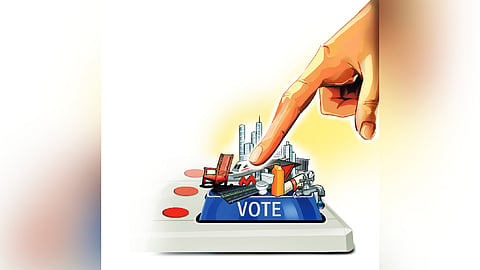Will a minority from Karnataka enter Lok Sabha this time?
BENGALURU: No member from the minority community has been elected from Karnataka to the Lok Sabha after the delimination in 2008. In 2009, 2014 and 2019, no minority candidates were elected and the last representative from the community was Iqbal Ahmed Saradgi, who represented Gulbarga in 2004, which was before the delimitation.
Even in the current scenerio in the two main parties -- BJP and Congress -- just one minority candidate is in the fray from the state. This is the situation even when minorities account for 16% of the state’s electorate.
Former MP and former deputy chairman in Rajya Sabha Rehman Khan noted that poor representation of minorities is not the case of Karnataka alone, but is specific to the entire country. “There are about 200 million Muslims in the country and the mainline parties have considered so few of them for tickets,’’ he said.
In Karnataka, the lone minority candidate who is contesting this Lok Sabha polls is Mansoor Khan, on a Congress ticket from Bengaluru Central.
“The preamble of the Constitution mentions equality which means socially, politically and economically. Just one minority ticket for a population of 15-16 per cent in the state shows that no one has any real respect for the preamble of the Constitution,” Karnataka Minority Commission chairman Abdul Azeem said, adding that without just and equitable representation, it is difficult to achieve real justice. “Constitutionally, no one should be deprived of representation. In the future, I hope this gap is bridged.’’
Former VC Prof Muzaffar Asadi said minorities are hesitant to raise the issue with the political apparatus or with the party in power. “It is not as if the community is small in number or negligible in size. Muslims can make or break the outcome in about 30 assembly segments and in about three or four parliamentary seats.
It looks like the community leadership lacks vision because they have not been taught about the parliamentary system. It feels like the minority community has been in a way suppressed or silenced given the ghettoisation of the community. It has not been allowing strong leadership to emerge. The absence of civil society is checkmating the possibility of creating democratic space that could have turned into political space.’’
Jamia Masjid Chief Imam Maulana Imran Rashadi said, “The deprived sections and minorities need to unite and work together to get more political representation.’’

